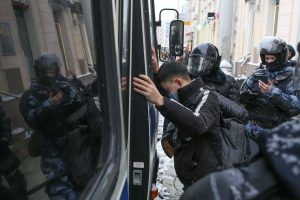Fresh Anti-Putin Protests as Navalny Prison Sentence Looms

Supporters of jailed opposition leader Alexey Navalny are staging the second wave of national protests in a week as a Russian court prepares to hand President Vladimir Putin’s chief critic a possible 3 1/2 year prison term.
Navalny, who defied threats of arrest to return in mid-January from Germany after a nerve-agent attack he said was an attempt by Putin to kill him, has vowed to keep up the pressure on the authorities even behind bars.
He and his allies are hoping Sunday to repeat the success seen on Jan. 23, when they brought out tens of thousands of supporters in more than 150 cities around the country despite police bans.
Authorities have warned against participation in the protests and most of the Navalny aides who weren’t already in prison were picked up this week, facing criminal charges. Still, the Kremlin is worried by the scale of the demonstrations and looking for ways to cool popular discontent that has been building up amid slumping incomes and the coronavirus downturn, three people close to the government said.
The Russian leader, 68, has been in power for more than two decades, the longest rule since Soviet dictator Josef Stalin. In July, Putin pushed through constitutional changes that would allow him to stay as president until 2036. His support last year dropped to a record low amid the Covid-19 lockdown, but recovered a bit by November, according to the Levada Center.
While he’s survived several previous waves of anti-Kremlin protests, steadily tightening restrictions on public demonstrations, the opposition is digging in for a long-term struggle ahead of 2024, when Putin must decide whether to seek a fifth mandate. Backers of Navalny say he’s turning into a potent symbol of resistance in prison.
Navalny, 44, was detained on Jan. 17 upon returning home from Germany where he recovered from a chemical poisoning during a campaign trip to Siberia in August. His imprisonment drew Western calls for his immediate release, including an appeal this week in a phone call from U.S. President Joe Biden.
After years of largely ignoring the anti-graft activist in public, the Kremlin has begun trying to refute his allegations. On Jan. 25, Putin denounced the protests as “dangerous” and dismissed claims in avideo released by Navalny that he owns a giant $1.3 billion Black Sea palace. The almost two-hour clip now has more than 100 million views. A pro-Kremlin online outlet released a video Friday from the palace, showing it’s still under construction, but Navalny’s allies said it was under renovation after mold problems required a complete overhaul.
Putin, Poison and the Importance of Alexey Navalny: QuickTake
On Friday, a Moscow court ordered Navalny’s brother Oleg and two allies, Lyubov Sobol and Anastasia Vasilyeva, placed under house arrest on suspicion of violating anti-Covid 19 restrictions. They have also opened a criminal case against one of the opposition leader’s top aides, Leonid Volkov, alleging he encouraged minors to participate in the unsanctioned protests. The opposition leader himself is accused of violating probation under a suspended sentence and faces new potential fraud charges that could carry an additional a 10-year punishment.
The challenge posed by Navalny has fueled tensions within the political elite. While one person close to the Kremlin said the authorities must act to reduce social tensions, another official said there is pressure for a hard line that will only worsen dissatisfaction and bolster Navalny’s appeal.
Source: Read Full Article

